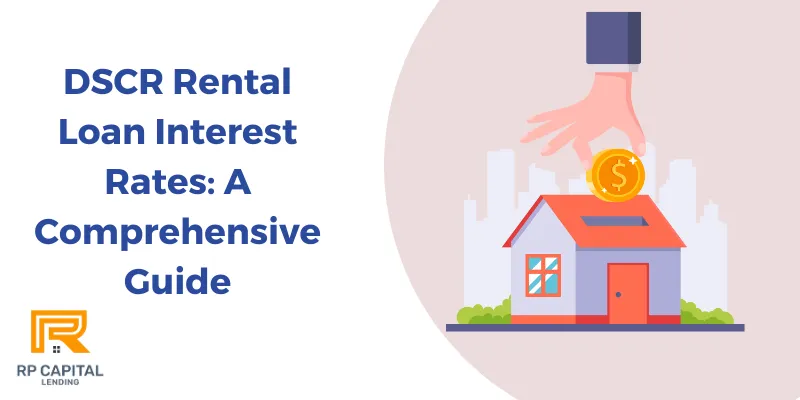Blog

Current DSCR Rental Loan Interest Rates: Everything You Need to Know
DSCR Rental Loan Interest Rates: A Complete Guide
For real estate investors looking to scale their portfolio, Debt Service Coverage Ratio (DSCR) rental loans are an essential tool. But the key to making the most of these loans lies in understanding their interest rates. In this blog, we'll dive into what DSCR rental loan interest rates are, current trends, and how you can navigate them to optimize your investment strategy.
What Is a DSCR Rental Loan?
A DSCR loan is designed for real estate investors and focuses on the property’s income rather than the borrower’s personal income. The debt service coverage ratio compares a property's annual rental income to its debt obligations, making it easier for investors to qualify based on cash flow, not personal finances. This makes DSCR loans a preferred financing option for income-producing properties.
Why Focus on Interest Rates?
Interest rates impact the overall cost of borrowing and, in turn, your cash flow. Lower rates can make a significant difference in profitability.
Current DSCR Rental Loan Interest Rates (2024)
As of Q4 2024, DSCR rental loan interest rates are hovering around 6.75% - 9.25%, with specific variations depending on the lender, location, loan terms, and the property's DSCR. These rates are generally higher than conventional loans, but the flexible underwriting makes them attractive to seasoned real estate investors.
Factors Affecting DSCR Loan Interest Rates:
Loan-to-Value (LTV): The more equity you have in a property, the lower your rate may be.
DSCR Ratio: A higher DSCR (above 1.25) usually leads to more favorable interest rates.
Property Type and Location: Multi-family properties in high-demand areas may command better rates compared to single-family rentals in less competitive markets.
Economic Conditions: Inflation, Federal Reserve policies, and overall market stability affect lending rates.
Historical Interest Rates Comparison
The graph below demonstrates the trend in DSCR rental loan interest rates over the last years, showcasing fluctuations based on economic shifts, inflation concerns, and Federal Reserve adjustments.

(Data Source: https://www.offermarket.us/)
Tips to Secure Lower DSCR Rental Loan Interest Rates
Boost Your DSCR: Improving the property’s income or lowering expenses will enhance the DSCR and may qualify you for better terms.
Shop Around: Different lenders have varying criteria for DSCR loans. Compare offers from traditional banks, private lenders, and mortgage brokers.
Consider a Shorter Loan Term: Shorter loan terms often carry lower interest rates but come with higher monthly payments. Weigh the pros and cons of loan based on your cash flow needs.
Refinance When Rates Drop: Keep an eye on market trends. If rates drop, consider refinancing your loan to lock in better terms.
Why DSCR Loans Are Attractive Despite Higher Rates?
You may wonder why DSCR loans tend to have higher interest rates compared to traditional mortgages. Here’s why they are still a favorite among investors:
No Personal Income Verification: Since DSCR loans focus on the property’s cash flow, you don’t need to provide personal income documentation like pay stubs or tax returns.
Flexible Underwriting: These loans accommodate investors with multiple properties or less-than-perfect credit.
Faster Approvals: DSCR loans typically have a more streamlined application process, allowing for quicker approvals compared to conventional loans.
Example: DSCR Loan Calculation
To help you understand how the DSCR impacts your loan, here’s a quick example:
Property Annual Income: $50,000
Total Annual Debt Service (Loan Payments): $35,000
DSCR = $50,000 ÷ $35,000 = 1.43
In this case, a DSCR of 1.43 indicates that the property generates 43% more income than the loan payments, likely qualifying the investor for favorable interest rates.
Conclusion: Navigating DSCR Rental Loan Interest Rates in 2024
While DSCR rental loan interest rates may be higher than traditional mortgages, they offer a flexible and efficient financing solution for real estate investors focused on rental properties. Understanding current market trends and the factors affecting your rates can help you make informed decisions that optimize your returns.
As always, keep monitoring the market and refinancing opportunities to take advantage of interest rate changes. Whether you're purchasing your first rental property or expanding an established portfolio, DSCR loans can be a key component of your real estate investment strategy.
FAQs
Q: What is the average DSCR rental loan interest rate in 2024?
As of Q4 2024, DSCR rental loan interest rates range between 6.75% and 9.25%, depending on factors like LTV and DSCR ratios.
Q: How can I improve my DSCR to secure better rates?
Increasing the rental income or reducing operating costs can improve your DSCR, making you eligible for lower rates.
Q: Do DSCR loans require personal income verification?
No, DSCR loans focus on the property's income and do not typically require personal income documentation.
Q: Can I refinance a DSCR loan if interest rates drop?
Yes, many investors refinance their DSCR loans when interest rates decrease to lock in better terms.
Q: Are DSCR loans available for single-family rental properties?
Yes, DSCR loans are available for single-family rentals, multi-family properties, and even commercial real estate investments.
Also Read:
RP Capital Lending is a d.b.a of RP Capital Partners Inc (NMLS # 2469193) | Privacy Policy
Copyright © 2022. All Rights Reserved.
Disclaimer: Loans only apply to non-owner occupied properties. Rates, terms and conditions offered only to qualified borrowers, may vary upon loan product, deal structure, other applicable considerations, and are subject to change at any time without notice.

